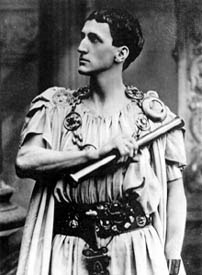This passage that Olivia and I are presenting is the scene in where Mark Antony first see's Caesar's dead body lying in front of Brutus, one of the conspirators. When Antony first comes in he shows his great despair and grief of how the mighty, noble Caesar was killed and wounded and is lying under the feet of the conspirators. During his great despair he mentions how Caesar, who was once the noblest and purest man in all of Rome, has now stooped so low at the feet if the conspirators. He also accuses the conspirators of being brutal murders and, asks them to take his life as well. However Brutus responds to this in the kindest manner he can and he explains to Anthony that what they did was out of honor and that now they may seem like murders but their actions are justified. The significance of this passage is that it is the first time when Antony one of Caesars closest friends, see’s Caesar’s wounded body for the first time and confronts Brutus about his act. It shows a new point of view on what the conspirators did and that there were many people who supported Caesar and were angered by his assassination. Many people, such as Mark Antony saw the conspirators act a very savage and butcher like act and they did not understand Brutus’s point of view. This passage also included foreshadowing, because Brutus promising Antony and explanation and Antony showing his anger towards the conspirators act, could lead to further conflict between the two.
Act Three, Scene 1:
Brutus:
But here cones Antony. Welcome, Mark Anthony.
Anthony:
O mightyCaesar! dost thou lie so low?
Are all thy conquests, glories, triumph, spoils,
shrunk to this little measure? Fare thee well.
I know notm gentlemen, what you intend,
Who else must be let blood, who else is rank:
If I myself, there is no hour so fit
As Caesar's death's hour nor to instrument
Of half that worth as those your sowrds, made rich
With the most noble blood of all this world.
I do beseech ye, if you bear me hard,
Now, whilst your purpled hands do reek and smoke,
Fulfil your pleasure. Live a thousand years,
I shall not find myself so apt to die:
No place will please me so, no mean off death,
As here by Caesar, and by you cut off,
The choice and master spirits of this age.
Brutus:
O Antony, beg not your death of us.
Though now we must appear bloody and cruel,
As by our hands and this our present act
You see we do, yet see you but our hands
And this the bleeding business they have done.
Our hearts you see not; they are pitiful;
And pity to the general wrong of Rome-
As fire drives out fire; so pity pity-
Hath done this deed on Caesar. For your part,
To you our swords have leaden points, Mark Anthony:
Our arms in strength of malice, and our hearts
Of brothers' temper, do receive you in
With all kind love, good thoughts, and reverence.
(p.116-118, lines: 148-176)







